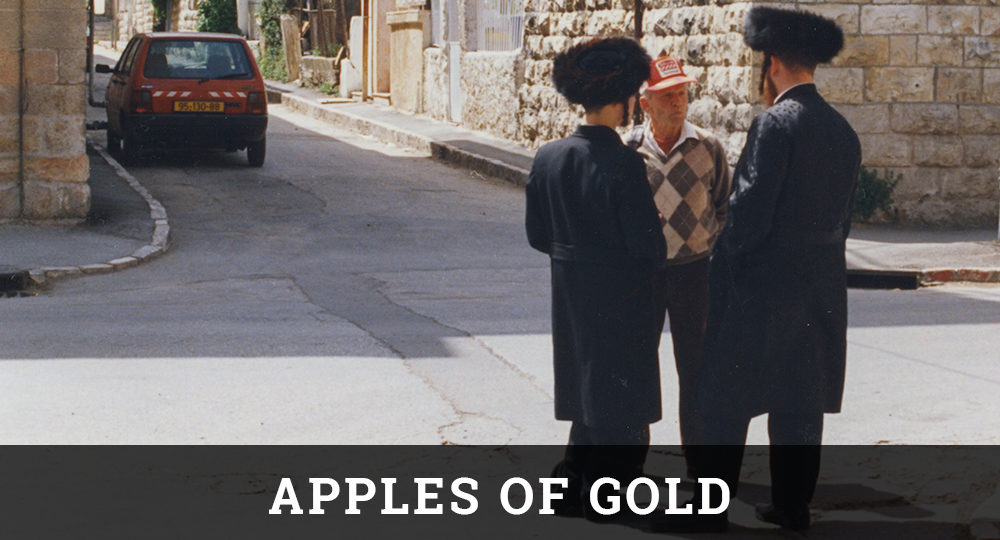Zvi Aug/Sep 1997
In Psalm 105:3 it is written, “Glory ye in his holy name; let the heart of them rejoice who seek the Lᴏʀᴅ.” The trouble is, many people in Israel have nothing in which to glory. They are going about with broken hearts. And where are they going? To the place they call “the most holy place”—their synagogues. They take their prayer books with them and read very loudly from them for several hours. Then they return to their homes, certain that their prayers have been received in the courts of heaven. They have been following this tradition for years and years, and no one tells them that they are praying in the wrong way. Such practices are followed by great grandfathers, grandfathers, fathers, sons—and on it goes.
I recently saw an elderly rabbi at the Wailing Wall praying from a prayer book. As a servant of the Lord, I felt compelled to approach him, to tell him that he is going through life in deep darkness, and to bring him into the light that is found in our Savior, Jesus Christ. But how? You cannot march up to a rabbi praying at the Wailing Wall and say, “Stop!” And so I moved closer to him and waited. When I had the opportunity, I asked what he was reading. He was surprised and asked, “Can’t you see that I am praying?” I replied, “If I understand prayer correctly, it does not come from a book but from the depths of the heart. Our forefathers prayed in that way. When Daniel was in great distress, he did not pray to God from a book but from his heart. So also it was with the patriarchs, those great fathers of the faith, and with our prophets.”
The rabbi then asked the question that I have heard so many times before: “To which sect do you belong, that you think you can come to us and teach us to pray? I am a Talmud teacher, and I have many students. You must realize to whom you are speaking!” I responded, “I am a servant of the Lord, as is everyone who believes in Him according to His commandments rather than according to the many old traditions that you teach you students. What you are doing is not according to the will of God. If you would like, I will open the Bible and show you that the Lord has told us to pray to Him from our hearts. Nowhere does it teach us to pray from other books. In fact, there were no other books when the Bible was written. You are teaching young boys to follow these traditions, which were written—and are still being written—by mere men. Unfortunately, unless someone brings them out of this terrible darkness, your students will grow up to be as spiritually blind as you are. In Ezekiel 33:7–9—a passage I have shared with many other Talmud teachers—we are told that it is the duty of true believers in the Lord to warn people when they are walking down the wrong path. In Ezekiel 36:26 the Lord promised to give a new heart to those who follow Him according to His commands.
“Rabbi, you asked me to which sect I belong. Now you must ask yourself the same question. Because of your many traditions, you are lost. You don’t know where you are spiritually. You are confused, and you need help.”
He just stared at me for a moment and then remarked, “No one ever said such things to me before.” I replied, “There is always a beginning, a first time for everything. I read those passages from the Bible because that is what the Lord wants believers to do. ‘Nevertheless, if thou warn the wicked of his way to turn from it, if he do not turn from his way, he shall die in his iniquity, but thou hast delivered thy soul’ (Ezek. 33:9).” I read that verse in a loud voice, hoping that the people standing near us would hear and learn how to obey the Lord.
This elderly rabbi was very sure of himself and wanted to show how smart he was when he was talking about his old traditions. But when we started to speak about the truth of God’s Word, he was helpless. This man who, at the beginning of our conversation, was not interested in listening to me, began to ask me questions.
In the course of our conversation he told me that his father, grandfathers, and great grandfathers were all rabbis, and now he is a rabbi. I then showed him a photo I carry in my wallet of my own great grandfather, who was a very well-known rabbi. I said, “Many things were written about him, and he even wrote some of the books of tradition that you teach to your students. But, with all of that, he was only a human being—just a man, like you and me. And everyone of us can make mistakes—we all sin. The greatest sin, however, is to hear the truth and not believe it. The truth is found in the one spoken of in Isaiah 53, the one who is never mentioned in your classroom or synagogue. Do you know who He is?” Again he stared at me, waiting for me to answer my own question. I read Isaiah 53 and asked, “Who was this one who was ‘wounded for our transgressions’?” He was silent for awhile and then asked, “What shall I say to this?” I continued, “The one who took upon Himself ‘the iniquity of us all’ was our Savior, Yeshua Hamashiah.” The rabbi became very serious and said, “Believe me, I have never read about Him in the Bible or heard that passage explained in that way.”
He then told me he had to leave but that he wanted to continue our conversation. He said, “I will meet you here again some day.” Please pray with me that we will meet again and that the Lord will grant me the privilege of seeing this rabbi’s blind eyes opened to the truth of the Savior, the Messiah of Israel.






